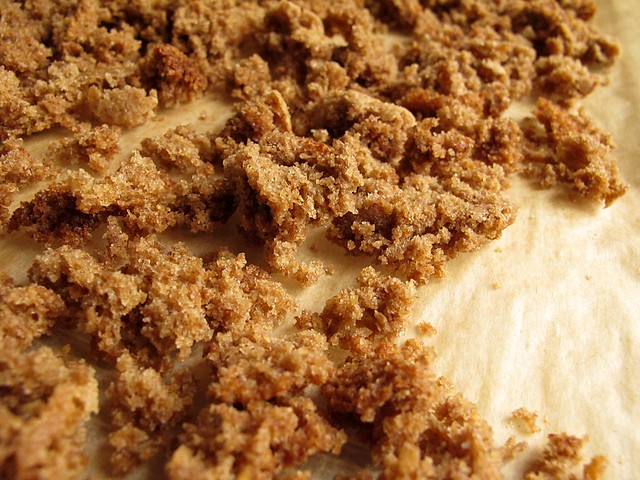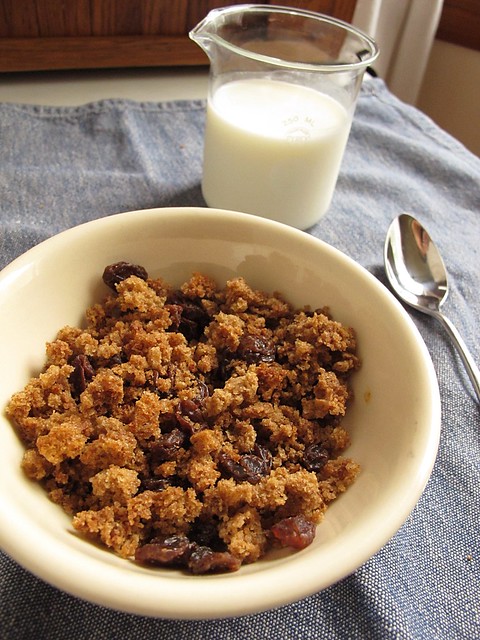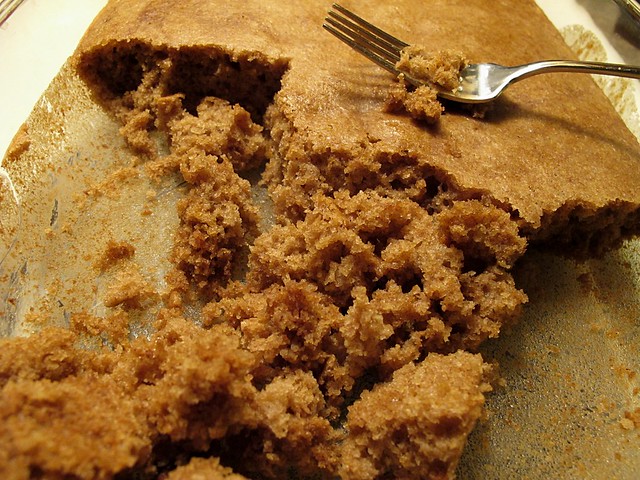But why are the health food nuts like me demonizing breakfast cereal? It all boils down to processing. Any quick Google search will show you in a number of places that all grains contain phytic acid, a naturally occurring acid that prevents the minerals in grain from absorption into you body. You can unlock the nutrition in whole grain by giving it the time to soak in acidulated liquid (like buttermilk, yogurt, or whey), or by first sprouting the grain and then dehydrating it and grinding it into flour.
Just typing that last sentence in seems like a lot of work, but consider how fast paced our lives are now. Traditional foods dictate traditional time, and when you have no t.v. show or Facebook to get to, gobs of time suddenly appear. This is the opening paragraph of Sally Fallon's Nourishing Traditions book:
Technology is a generous benefactor. To those who have wisely used his gifts, he has bestowed freedom from drudgery; freedom to travel; freedom from the discomforts of cold, heat and dirt; and freedom from ignorance, boredom and oppression. But father technology has not brought us freedom from disease. Chronic illness in industrialized nations has reached epic proportions because we have been dazzled by his stepchildren - fast foods, fractionated foods, convenience foods, packaged foods, fake foods, embalmed foods, ersatz foods - all the bright baubles that fill up the shelves at our grocery stores, convenience markets, vending machines and even health food stores.Breakfast cereal is the definition of fractionated food: it is made from grain that is treated harshly with heat and pressure, coatings to keep it crunchy and artificial colors and flavors. Even the added vitamins are from suspicious sources - most of which are not even viable after the heat and pressure treatments. Grains are reduced to liquid form and extruded into shapes, and as Fallon mentions in this article, it costs pennies to produce and sells for $4-$5 a box, making it one of the highest profit margins in the food industry. Skeptical as I can be about the latest health crazes and claims, it seems fairly logical to me that something that makes so much money for so many involved is hiding and harboring all kinds of things that consumers don't want to know about. (Like the recent reveal of GMO's in Kashi...)
But enough on boxes of processed cereal. We can eat real breakfasts! We can even eat real breakfast cereal once again. I just finished making a big batch of this cereal I recently read about on The Healthy Home Economist. It's good. It's really good. And even the Kiddo liked it.
The best thing about this recipe is that it is basically a cake that is crumbled up and dehydrated. Not only can you just enjoy it as a cake the possibilities are endless for cereal flavor variations. I'm thinking even a chocolate version could easily appear sometime in the near future. I dehydrated this because I have a dehydrator, but Sarah bakes hers at a low temperature until crisp and dry.
Real Cold Breakfast Cereal (the Healthy Home Economist)
(my yield was 2 half gallon jars of cereal)
- 6 c. freshly ground organic flour (I used about 3 cups each of soft wheat and spelt)
- 3 T. whey added to enough water to make up 3 cups
- 3/4 c. coconut oil, melted prior to measuring
- 1 c. maple syrup
- 1 t. maple extract
- 1 t. vanilla extract
- 1/2 t. salt
- 1 T. cinnamon
- 2 t. baking soda
In a very large bowl, mix the flour with the whey/water until it is smooth and well combined. Cover with a clean towel (I like to also top it with a lid from a large pot to prevent a skin from forming on the top), and let soak at room temperature for 24 hours. (I have read elsewhere that as long as you soak 7 hours or longer, the enzymatic change has taken place in the grain. I let mine soak for about 20 hours.)
After soaking, preheat oven to 350 degrees. Add the rest of the ingredients and stir very well until well mixed. Batter will be very sticky will kind of form a single mass. Divide the batter into 2 9x13 glass pans (no need to grease them, and no need to be exact), and bake for 20-30 minutes until a tester comes out clean.
Cool the cakes in their pans, then crumble them into small pieces. Spread onto dehydrator trays and dehydrate at 147 degrees (or as hot as your dehydrator goes) until fully dry and crisp - this was just overnight for me. Time will vary with heat and the size of the cake pieces. When dry, you can crumble the pieces further if you like. Store in glass jars or a zip top bag - it's recommended to store in the fridge, but I have some space so I may pop my jars into the freezer for optimum crunch preservation. I would recommend storing without dried add-ins, and adding them directly to your cereal bowl.

This cereal tastes exactly like a raisin or "All-Bran" type cereal, and was especially great with raisins. I'd recommend storing it out of sight quickly, because it's really easy to keep on munching on it dry. If you eat at a moderate pace, it keeps fairly crunchy in milk too. I'd really like to sneak some ginger into the batter, but may have to settle for a few cubes of crystallized ginger in my own bowl since the Kiddo doesn't share my taste for it.
Also, earmark this recipe as a really great cake in its own right: it reminded me of the soaked and sourdoughized applesauce cake I've made in the past. Add in some raisins and nuts prior to baking, and you're in business! (I may recommend using half the recipe, unless you need 2 9x13 cakes...)
It's easy to want to grab a quick breakfast before running out to start our harried, modern days, so it's easy to see just why marketed boxes invade our homes. My challenge to myself was just not to buy any cereal, and then I was forced to make and eat real food for breakfast. I usually just have a smoothie fortified with chia, but it's definitely more of a challenge to satisfy a child without the aid of the almighty cereal box. But time has passed enough now that we don't miss cereal as frequently as we once did. Now with the revelation of "dehydrated cake as breakfast", the upcoming school year may have one more breakfast option on the menu. I'll take the long waiting times to produce my own convenience food, it's definitely worth it!


